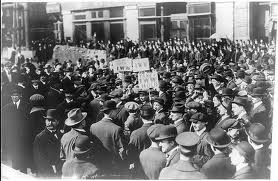
Trade unions
With the consolidation of the industrial society originated unions for workers, inevitable consequence because during the initial development of modern industry, in most countries, the workers were deprived of political rights and had little influence on working conditions.
Trade unions developed in the first place, as a means to balance the imbalance of power among workers and employers. Individually, the workers had little power, but thanks to the collective organization their influence greatly increased, in fact, an employer can put pressure on one worker, but not on all or a majority of factory workers or an establishment.
Originally, trade unions were organized mainly in a "defensive" manner, which offered the workers a means to counter the overwhelming power exercised over their lives by employers.
Today workers have the right to vote in the political sphere, and there are institutional forms of bargaining with employers, through which it is possible to advance economic demands and express the reasons of dissatisfaction.
READ ALSO:
The first industrial revolution
The second industrial revolution
The changes made by the industrial society
The industrial societies and transformations
The family and the influence of the industrial society